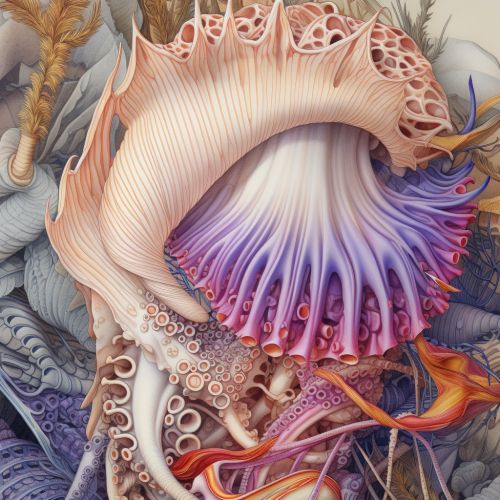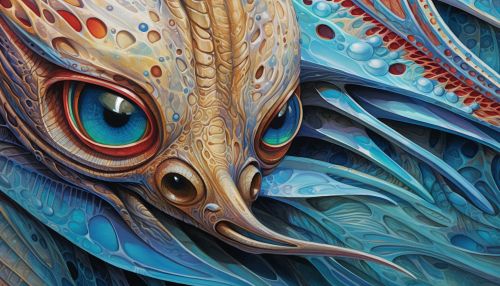Cephalopoda
Introduction
The Cephalopoda are a class of mollusks that includes some of the most intelligent and mobile of all invertebrates. This class includes species such as the octopus, squid, and cuttlefish. Cephalopods are characterized by their bilateral body symmetry, a prominent head, and a set of arms or tentacles. They are known for their highly developed nervous system and complex behavior.
Anatomy and Physiology
Cephalopods have a complex and highly developed anatomy. The main body mass is enclosed in the mantle, which has a swimming fin along each side. These fins, unlike in other marine organisms, are not the main source of locomotion in most species. The visceral mass, which includes the heart, digestive and reproductive organs, is contained in the mantle cavity.


Cephalopods have a closed circulatory system, which is unique among mollusks. The blood, enclosed in vessels, is pumped by the heart to the organs and tissues. The gills are used for respiration and are located in the mantle cavity.
The nervous system of cephalopods is the most complex of any invertebrate. The brain is highly developed and is protected by a cranium. The eyes of cephalopods are highly developed and bear a striking resemblance to the vertebrate eye, a classic example of convergent evolution.
Behavior and Ecology
Cephalopods are found in all the world's oceans, from the tropics to the polar regions. They occupy various ecological niches, and have various strategies for survival.
Cephalopods are known for their advanced behavior. They are capable of learning and remembering complex tasks, which is unusual among invertebrates. Some species have been observed using tools, a behavior usually associated with higher vertebrates.
Many cephalopods are able to change their skin color and pattern rapidly, thanks to specialized cells known as chromatophores. This ability is used for communication and for camouflage.
Evolution
The cephalopods have a long geological history, with the first cephalopods appearing in the late Cambrian period, nearly 500 million years ago. The class has undergone several evolutionary radiations, resulting in the diverse group of species seen today.
Human Interaction
Cephalopods have a significant impact on human society. They are a major source of protein in many coastal communities around the world. They also play a significant role in literature and mythology, with creatures such as the giant squid being the subject of many legends and stories.
Conservation
Many species of cephalopods are currently under threat from human activities, such as overfishing and habitat destruction. Conservation efforts are being made to protect these unique and valuable creatures.
